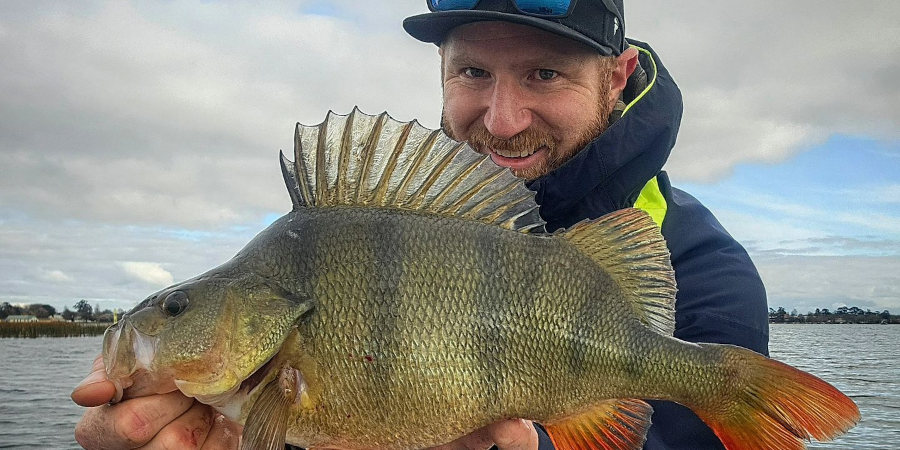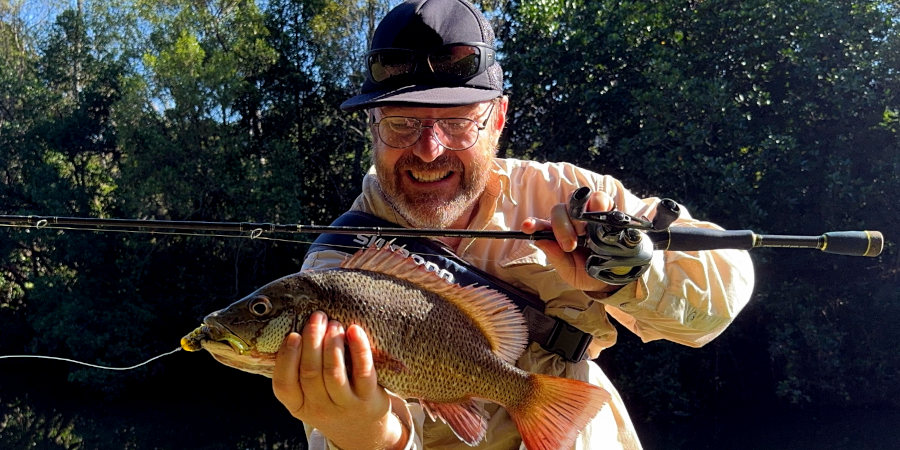
Greg "Doc Lures" Vinall
Podcast Host, Lure Maker, Scientist, Educator
Greg is host of the Australian Lure Fishing Podcast. He’s an Aquatic Scientist, Lure Maker, Speaker and Author in the recreational fishing space. Greg takes great delight in teasing out the science behind fishing and looking for opportunities to better understand our quarry and what makes them tick.
Key Messages
- Like all animals, fish DO sleep. All animals sleep to enable their brains to process the data (memories, learnings etc) from their day. Fish don’t have eyelids or show facial expressions, so it can be tricky to tell if they are asleep, but they have periods of low activity with lowered metabolic rates and a high threshold to stimulus that signifies they are sleeping.
- Sharks, rays and some larger pelagic species such as tuna continue to swim while they are sleeping, although at a slower pace than when they are awake. Many bony fish species will seek refuge in a cave, log, weedbed or other structure while they sleep. Others sleep near the water surface.
- Like humans (and other animals), fish aren’t completely unconscious while they sleep. Their brain filters out unnecessary information, but they will wake if there is a threatening noise, vibration or other indicator.
- We don’t know if fish dream, but it’s considered likely that they do. Recent video of a sleeping octopus displaying hunting colours suggests that it was dreaming about hunting. It’s not hard evidence but it does point to the possibility that fish might dream.
- Most animals when woken from a deep sleep will initially exhibit a fleeing response, so waking a fish up by banging lures through a snag may cause it to spook. However, all species are different and continuously waking a fish that is trying to sleep might well cause an aggressive strike.
- It is possible that sometimes when fish are showing on your sounder but not responding they might actually be sleeping.
- Doc’s theory: When fishing to shut down fish try using subtle surface lures to start with then progressively switch to more aggressive lure styles and get them closer to the fish. The idea is that gently waking the fish with vibrations and sounds that aren’t to threatening is less likely to spook them. Getting closer to them with noisier lures might then be more successful because you’re not waking the fish with a jolt. It’s just a theory – put it to the test and let me know how it goes.
Soft Plastic Lure Fishing Hacks 101 With Greg Vinall
EPISODE # Check out our archives for more information on Botany Bay Fishing Spots!Fishing with soft plastic lures can be incredibly rewarding if you know how to use them effectively. With over 25 years of experience, I've picked up a range of tips and tricks that can...

Advanced Soft Plastic Techniques With Rory Benn-Clibborn
This interview with Rory Benn-Clibborn is EPISODE 679. Check out our archives for more information on Lure Fishing In Australia!In this masterclass, I chat with Rory Benn-Clibborn from Perch Palm Lures about various advanced techniques for fishing with soft plastic...

Mastering Stealth: Techniques for Fishing in Pressured Waters
In today’s episode we’re exploring the five top tips for catching fish in waterways that cop a lot of fishing pressure.

I must spend too much time fishing solo as I often wonder how / where fish sleep! This episode is gold and definitely has me thinking about different approaches to wake fish up during quiet sessions!! Well done Greg, thanks!!!
Glad you enjoyed it Steve, the aim of my rants is always to get people thinking, that’s how we discover new things and expand our horizons. Good luck waking them up!
I have a hypothesis that there can at times be a truce of sorts (for whatever reason) between bait fish and predators on the top and the bottom of the tides when the current slows to a halt, at least in estuary environments. Hostilities resume when the flow recommences. It’s noticeable in the absolute panic in popeye mullet when the inward flow starts, the mullet scarper from the middle of the river straight to shore and pack up tight in the drainage creeks. Just wondering after listening to this if the predators are having a kip in the low flow periods providing that truce and then waking up to feed as the flow starts to increase with the bait already starting to concentrate in those areas and in numbers that allow them to feel less insecure????
Could well be Dick. It would make sense if they slept when the flow was reduced, I suppose!